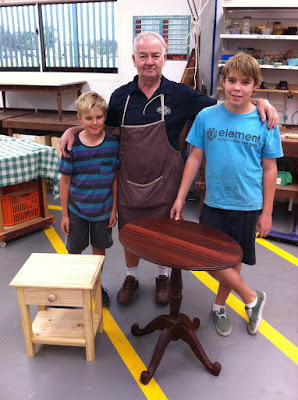I recently had the pleasure of facilitating the "Intergenerational Creations" program at the Stirling Community Men's Shed. Over 5 consecutive Saturday mornings, a bunch of Grandfathers and grandkids came together to make stuff, at the wonderful facility, the Stirling Community Men's Shed. They have a fantastic woodworking workshop at the Shed, in regards to machinery and power tools - however it's not really set up for hand tool woodworking. We need to do some work on that front!
 |
| The promotional flyer for the program. |
Initially there was no plan, other than the grandads and grandkids would be making things together. As the facilitator, my task was to put the meat on the bones, so to speak, and to enable and guide the whole thing to a successful conclusion. So how to do this? The projects we would embark upon needed to be meaningful, "do-able" for young and old, and achievable in the timeframe. In order to focus the energies and ideas of the participants, I decided to narrow the field down. We would make tables.
On Day One, after the introductions, I explained to the group the process ahead... We would be making tables together over the next 5 Saturday mornings. First, I lead a discussion where we explored the anatomy of a table. The essential ingredients, the range of variations and possibilities, the names of the components, and the likely cutting list considerations. It would be up to the pairs and trios to decide together what type of tables they would make, whether they would make one each or one between them, and so on. I gave each small group some plywood, rules and pencils, and suggested they drawer a full scale front view of their table(s) in order to get the proportions right, plan the dimensions, and ensure they are clear on the direction ahead. Plywood set-out boards are far superior to paper, survive being kicked around the workshop, and can always be recycled into jigs or drawer bottoms when we have finished with them!
The material we would use would predominantly be pine from Japan. Packaging, in fact, derived from crates holding huge tyres imported for trucks in the mining industry. These boards were about 14" (350mm) wide, over 1 3/" (45mm) thick, and around 7 feet (2.1m) long. There were also some 3" square pine sticks (75x75mm) from the same source and of similar length. I had several small tables there as examples which we referred to in our discussions, and the small groups got down to talking together and drawing. The first day ended with people starting to machine up timber for their projects. I had demonstrated how to use a jack plane and winding sticks to flatten one face of a piece of board in order to put it through the thicknesser. Then they got going. The mob were so enthused, it was very hard to get them to stop at the designated time! The program was off to a good start.
The following weeks were a hive of activity, with a range of tables coming together. There was oodles of enthusiasm, much to learn, and much sharing of information taking place. Some of the grandads did do some additional work on the more complex tables, and a couple of dads also came in to assist at times on the Saturday mornings.
By the time Day 5 came along, the final week, all of the tables were completed though not all were polished. One pair had made a spice rack together instead of a table, which was fine. The concluding BBQ together on that last day was a happy occasion with other family members there also. All were impressed with the wonderful array of creations that he been produced by these Grandads and their grandkids working together.
The results.
 |
| Bert and Dermot made this nice little occasional table together. |
 |
| Bernie helped Callam and Aiden make a small table each. |
 |
| Ashley and Raff built this beaut desk together. |
 |
| Alf and Aaron with the pair of bedside tables they made. |
 |
| Daniel and Doug made this Spice Rack together. |
 |
| David worked with James and Luke to make their tables. Their Dad's came and helped at times too! |
Over the 5 weeks, I observed so many wonderful moments. I was delighted to see the level of participation increasing, as the older guys increasingly ensured the young guys were engaged and involved. Information, ideas and experience were shared, and learning took place together.
It was the kind of working together that the program was originally designed to foster and facilitate. The program was a winner in many different ways. Thanks to the City of Stirling, the Stirling Community Mens Shed, to Ben and Mike and to the participants for their great contributions.
It was indeed a pleasure to share with these grandads and grandkids as we made stuff together...



